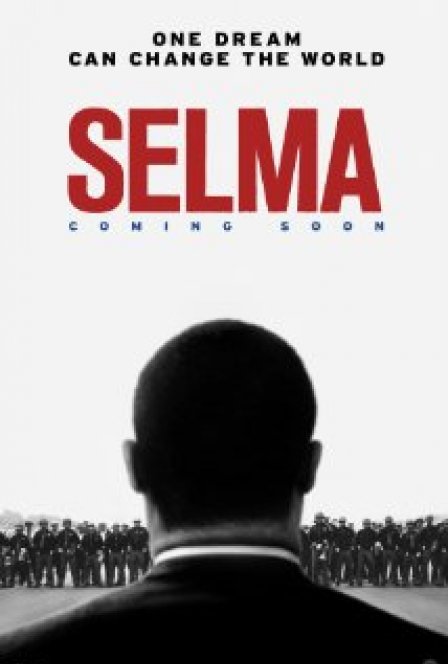Selma opens on Dr. Martin Luther King accepting his Nobel Peace Prize on October 14, 1964, and closes at the very end of the famous Selma to Montgomery freedom march, on March 25th, 1965, as King delivers his “How Long, Not Long” speech on the steps of the Alabama state capitol. In between, we see the bombing of the church in Birmingham in which the four little girls were murdered, the gun murder of Jimmie Lee Jackson by a state trooper that catalyzed the march, the Machiavellian scheming of Governor George Wallace (Tim Roth) to end the march, a President (Lyndon Johnson, played by Tom Wilkinson) forced into action by nationally televised violence, and King himself forced to watch his wife listen to an FBI recording of his supposed infidelities. There’s a lot of information to pack into five months, and while Selma aims to be as rousing and inspiring as its subject’s life would seem to demand, it’s greatest asset is its storytelling acumen.
Early in the film, after being rebuked by a pragmatic President Johnson, King and his top lieutenants in the Southern Christian Leadership Conference decide their greatest chance for winning passage of a Voting Rights Act, which they know will curb a system that’s been keeping blacks from the poles throughout the south, is to draw attention to themselves by taking over a large-scale march in Alabama. Before the SCLC can take over the planning and execution of the Selma march, King himself (David Oyelowo) has to convince the young leaders of the previous group to lead the movement, the Student Nonviolent Coordinating Committee, that he and his group are better suited for the job. The two young men who head the SNCC, John Lewis (Stephen James) and Sullivan Jackson (Kent Faulcon), are skeptical of the SCLC’s ability to lead. They accuse King of wanting the spotlight and cite his group’s previous failures to effect change in other parts of the south. King, who seems to never speak to anyone in Selma except in the form of a rousing speech, gives Lewis and Jackson a refined oration to the effect that the SCLC’s talent for finding the spotlight is exactly what will make the planned Selma to Montgomery march a success. King argues that his ability to get the attention of television cameras and newspaper reporters will force the politicians (including, of course, the President) to respond to the injustice they’ll see on TV and in the papers. The leaders of the SNCC, of course, bow to King and watch his tactics work.
Director Ava DuVernay and her screenwriter, Paul Webb, seem to have internalized the same message. They realize that it isn’t so much the content of their film that needs to be at the forefront (everyone knows the Civil Rights movement was necessary, that Martin Luther King was fighting a fight so obviously justified that in retrospect the men who opposed him are impossible to understand) but rather the fact of its existence as a tribute to King at a time in America that needs one. Selma doesn’t have to present anything new about Martin Luther King, and it certainly doesn’t aim to uncover parts of the man that people who aren’t King scholars didn’t already know. The movie exists to rouse and inspire. It’s a greatest hits of the five months that a group of remarkable leaders took to plan and orchestrate an event that made history.
It’s a polished film, too. Oyelowo as King is pitch-perfect, though somehow very actorly. He’s British and highly trained, and watching him onscreen he doesn’t embody King so much as find ways to convey the nuances of internal conflict and stress without bursting the façade of his impression. He’s more skilled than passionate, but so is the movie, and Oyelowo serves it perfectly. DuVernay is assured and directs confidently; we’re always aware of exactly how King’s complicated movement is proceeding and why he chooses the tactics that he does. The way she moves from the famous Bloody Sunday encounter between marchers and state troopers at the Edmund Pettus Bridge to the national reaction to television coverage of the marchers being beaten to Johnson’s personal aggravation at knowing he must react to the march is like a master class in constructing a film sequence.
It’s going a bit too far to compare Selma to a world-class performance of a Martin Luther King Day Pageant, especially because that would tend to devalue a lot of heartfelt performances (despite all of them, no one in the movie except King emerges as a fully fleshed out human being, but that’s owing to the script not the actors), but the movie has whiffs of conscious myth-making. It’s not going too far to say DuVernay is making an honest tribute to King and a movie that is intended to serve his legend. She and the film have gotten a lot of media attention for being all but shut out of a suspiciously racist-looking Oscar season, even though it’s at least as good as 90% of the movie’s nominated this year; that’s a dubious compliment given the stock of nominees, but the Oscars-related media firestorm will serve the legend anyway. Selma won’t stand up to the inevitable comparisons to Spike Lee’s really psychologically probing Malcom X over time, but it will be watched and talked about (in more than just social studies classes, too) for decades, which is more than anyone can say about crap like Birdman or American Sniper (TMT Review). Greatness was Martin Luther King’s burden; the fact that it’s missing from a film about him doesn’t really hurt a thing.

